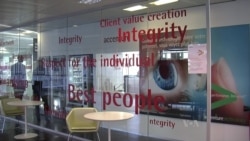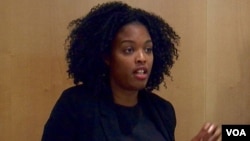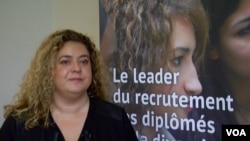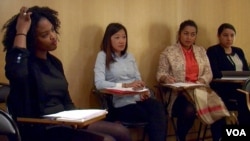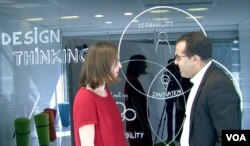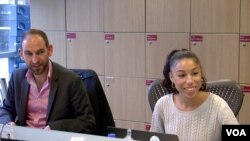Fatou Kane sees two realities on the job market. The first is in London, where she spent time working and studying. And another is in France, where she graduated with a Master’s degree in human resources.
"When you're outside of France and you're black, you can show who you are. They are looking for people who are different," said Kane, 25, whose family hails from Senegal. "But when you're in France, you have to fit the rules. And if you don't know the rules, you don't succeed."
Yet today, Kane is learning to succeed by a new set of rules. She counts among the latest crop of young graduates selected by Mozaik RH, a French headhunter that seeks talent from the banlieues — France's gritty, immigrant-heavy suburbs that are better known for crime than as incubators for future CEOs.
Mozaik has mentored and placed more than 3,000 candidates since its founding in 2007, working with roughly 150 French companies. Last month, it signed a contract with France's state employment agency. Its message that diversity is an asset is beginning to sell.
"We try to help candidates be themselves. They could be called Fatoumata, be an engineer and live in Villiers-le-Bel," said deputy director Estelle Barthelemy, describing the gritty Paris suburb she comes from. "We're trying to show this is a richness, not something to be ashamed of."
For companies, Mozaik's selling point is the bottom line. Not only is it helping them hire top-notch staff, but also finding employees that reflect their diverse customer base and tick corporate social responsibility boxes, Barthelemy says.
"We're not a charity," she added. "This is about business."
Powering Mozaik's crusade is a new government study that finds reducing job discrimination could boost France's economy by a stunning $165 billion or more, about 7 percent of the country's GDP.
"More than 200,000 jobs are not filled in France," Barthelemy said. "When people are unemployed, it's more than a pity. It's economic craziness."
In some ways, France's color-blind policy is part of the problem, experts say. Official statistics based on race and religion are banned here, making it difficult to gauge the size of discrimination, much less fight it. Efforts to promote affirmative action, known here as "positive discrimination," have proven controversial.
Only recently have top universities begun to actively recruit students from the banlieues, although they use economic criteria rather than race or religion in the selection process.
Leveling the job market is perhaps even more challenging. Studies show ethnic and religious minorities must send out many more resumes to land interviews than "traditional" candidates, and foreign last names and postal addresses can be major handicaps.
Last May, the government rolled out a poster campaign aimed at attacking workplace discrimination, twinning photos of white and minority candidates with the tagline, "skills first."
Deputy director Barthelemy believes the initiative is too timid. "This issue is really an emergency," she said.
Mozaik deliberately selects the best and brightest, targeting candidates with post-college degrees who enroll in its workshops on improving their resumes and interviewing skills. The agency mentors them until they land a full-time job, passing on its fees to participating businesses.
"I feel like we're empowered here," said Kane, who recently attended Mozaik training with several other women. "People believe in us, that my difference is my strength."
More than a dozen Mozaik graduates are employed at the Paris office of global consulting giant Accenture, which also promotes gender and sexual diversity. Accenture managers are handed booklets on religious practices to better understand their multi-faith staff.
At stake, says Khalid Lahraoui, who oversees Accenture's diversity efforts for the France and Benelux regions, is not political correctness, but the bottom line.
"Diversity generates more creativity and innovation," said Lahraoui, whose own parents are Moroccan immigrants. "It's clearly linked to our business."
Down the hall, graduate student Rachel Priest jokes with her colleagues. A Mozaik recruit whose parents hail from the French West Indies, she now juggles studies with a part-time communications job at Accenture.
"Of course there's discrimination," she said. "This is a global company and our origins and background are seen here as an asset; but, it's not the same everywhere."




